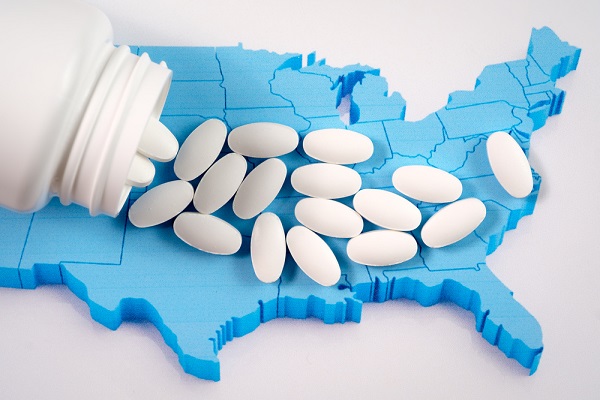 A deal would resolve claims by almost every U.S. state and many cities and counties that the family and Purdue sparked the ongoing U.S. opioid epidemic through wrongful marketing tactics for OxyContin. (Image: Shutterstock)
A deal would resolve claims by almost every U.S. state and many cities and counties that the family and Purdue sparked the ongoing U.S. opioid epidemic through wrongful marketing tactics for OxyContin. (Image: Shutterstock)(Bloomberg) –The Sackler family and their embattled drugmaker, Purdue Pharma LP, are backing a proposal to resolve all opioid lawsuits against themselves and the drugmaker for more than $11 billion in what would be the largest settlement to date in the sprawling litigation over the addictive painkillers, according to people familiar with the proposal.
Under the proposal, Purdue will file for bankruptcy, hand itself over to a trust controlled by the states, cities and counties that have sued, and sell its overseas drugmaker Mundipharma, according to the people. In addition, the Sacklers will dig into their own pockets for at least $3 billion in cash. Funds from those sources would generate $11.5 billion to cover the fallout from the opioid epidemic, said the people, who asked not to be identified because the talks are private.
Related: New lawsuit unveils scope of Purdue's 'extraordinary efforts' to push opioids
In return, the Sacklers and Purdue — maker of OxyContin pain medicine — would see more than 2,000 suits against them wiped out, the people said. A deal would resolve claims by almost every U.S. state and many cities and counties that the family and Purdue sparked the ongoing U.S. opioid epidemic through wrongful marketing tactics for OxyContin, the people said.
The settlement would be separate from ongoing negotiations involving state and local governments seeking a global settlement of opioid claims against drugmakers including Johnson & Johnson and Endo International Ltd and drug distributors McKesson Corp and Cardinal Health Inc.
The proposal, some details of which were first reported by NBC News, came during settlement negotiations sponsored by a federal judge in Cleveland last week, the people said. More than a half dozen state attorneys general were involved in the meeting as well as lawyers for cities and counties, they said. David Sackler, representing one wing of the Sackler family, also attended, according to NBC.
U.S. District Judge Daniel Polster has asked both sides to report back to him on the status of the talks by Aug. 30, the people said.
Judge's ruling
In March, Purdue settled OxyContin marketing claims brought by the state of Oklahoma for $270 million. On Monday, a judge in Oklahoma ordered J&J to pay $572 million for creating a public nuisance in the state with its over-promotion of its opioid pain medicines.
"While Purdue Pharma is prepared to defend itself vigorously in the opioid litigation, the company has made clear that it sees little good coming from years of wasteful litigation and appeals,'' the company said in an emailed statement.
"The people and communities affected by the opioid crisis need help now,'' the company said. "Purdue believes a constructive global resolution is the best path forward, and the company is actively working with the state attorneys general and other plaintiffs to achieve this outcome."
Davidson Goldin, a spokesman for some members of the Sackler family, didn't immediately respond after regular business hours Tuesday to calls or emails seeking comment on the settlement proposal.
States and local governments accuse Purdue of deploying hyper-aggressive marketing tactics to dupe doctors into over-prescribing OxyContin, leading to a surge in overdoses and addiction across the country. A 2017 congressional investigation found more than 50,000 Americans died from drug overdoses in 2015 alone, with a third of those deaths linked to prescription opioids including OxyContin and Insys Therapeutics Inc.'s Subsys.
The settlement will be facilitated through a bankruptcy filing and creation of a trust, the people said.
Bankruptcy filing?
Purdue Chief Executive Officer Craig Landau said in March the company hadn't made a final decision on whether it will seek a Chapter 11 bankruptcy filing, but that it was "an option." Purdue officials are trying to decide whether to file the case in Delaware or New York sometime within the next month, which would remove them from the upcoming trial, the people said.
The Sacklers will hand Purdue over to the states and local governments as part of the bankruptcy reorganization, the people said. The trust would own the drugmaker and independent trustees would appoint managers to run it, the people said.
The company's assets — including cash on hand, continued sales of OxyContin and other drugs, insurance — are expected to generate as much as $7 billion to compensate municipalities for tax dollars spent on the opioid crisis, the people said.
The sale of U.K.-based Mundipharma network of companies may generate as much as $1.5 billion. If bidders won't go that high, the Sacklers have agreed to make up any shortfall up to a maximum of $1.5 billion, the people added.
Annual revenue
Mundipharma generates more than $3.4 billion in annual revenue through overseas sales of OxyContin and biosimilars, the people said. Biosimilars are cheaper versions of complex biological medicines that are in increasing demand globally.
All monies will flow into the trust, which will oversee payouts, the people said. Such entities have been used for years by companies facing thousands of asbestos suits to resolve hundreds of billions of dollars-worth of litigation. Big-name corporations such as Halliburton Co. and W.R. Grace & Co. have set up trusts, which are separate from the companies, to settle suits accusing their asbestos-laden products of causing cancer.
Some attorneys general seem determined to take a tough line.
"From the day we filed our complaint, I and other attorneys general from around the country said the Sackler family needs to be held accountable for their actions hooking this country on OxyContin," New York Attorney General Letitia James said in an emailed statement. "This family started a national fire, and an arsonist should never give advice on fire prevention."
Almost 400,000 people died from opioid overdoses in the U.S. from 1999 to 2017, according to the Centers for Diseases Control and Prevention. While fatalities from prescription pills have leveled off, deaths from illegal heroin and synthetic opioids have skyrocketed.
The consolidated Cleveland case is In Re National Prescription Opioid Litigation, 17-md-2804, U.S. District Court, Northern District of Ohio (Cleveland).
© Touchpoint Markets, All Rights Reserved. Request academic re-use from www.copyright.com. All other uses, submit a request to asset-and-logo-licensing@alm.com. For more inforrmation visit Asset & Logo Licensing.






